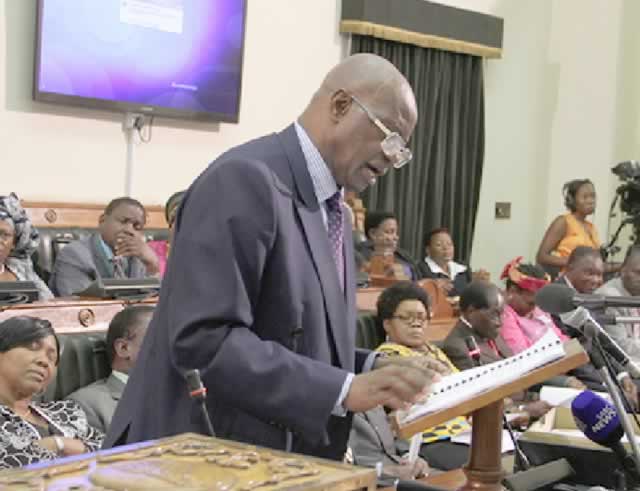
The Sunday News

Roberta Katunga
ATTEMPTS by Finance Minister Patrick Chinamasa to lure investors and ensure fresh capital injection into the economy by providing clarity on the Indigenisation and empowerment policy have attracted mixed views with some analysts saying they would create more confusion and uncertainty.
In his 2015 budget presentation, Minister Chinamasa said significant investment into the economy was needed for retooling, recapitalisation and overhaul of the antiquated machinery and for value addition.
“Given the need to continue improving our investment climate in light of the need for both domestic and foreign investment, the 2015 Budget needs to further provide clarity on our Indigenisation and Empowerment Framework.
This will be in order to ensure consistency and predictability in Government’s engagement with stakeholders and investors,” said Minister Chinamasa.
In a bid to bring the much needed clarity to the Indigenisation Act, Minister Chinamasa said it was critical to restate that the 51/49 percent ownership structure enshrined in the Indigenisation and Economic Empowerment Act applied across all sectors of the economy although this would not be achieved overnight.
“The period necessary for compliance with the law will be a matter for negotiation between the would-be investor and the respective/relevant line Ministry responsible for the particular sector/sub-sector. The Indigenisation plan would take into account the circumstances prevailing in the sector/sub-sector.
It is the responsibility of the line Ministry to make the assessment on the investment concerning compliance with the Indigenisation and Empowerment Policy,” he said.
However, analysts have questioned this move by the Finance Minister arguing that leaving all responsibility to line ministries was likely to create more confusion as every investment was subjected to the discretion of the ministry.
Lynton Edwards Stockbrokers research analyst Mr Kudzanai Sharara said leaving line ministries to make their own discretionary decisions deal by deal increased the uncertainty of the law as well as opening negotiations to more than 10 ministries opened space for corruption and rent seeking.
“I think instead of bringing clarity to the indigenisation law, the minister actually brought more confusion. If you are to ask any investor or any financial advisor today about what to expect in terms of the law, none will be able to give you a definite answer and this means investors are not certain on what to expect from the Zimbabwean government.
Laws should be written in black and white so that interpretation by one minister and anyone for that matter is the same. Remember some of the deals signed by Minister Kasukuwere were not endorsed by Minister Nhema because the two interpreted the laws differently,” he said.
Mr Sharara said in as much as ministries should be allowed to approve the deals inorder to speed up the process; they must all be given the guidelines and set timeframes for compliance.
“This increased uncertainty will result in investors continuing to shy away from investing in the country. They will continue to seek clarity and unfortunately Minister Chinamasa lost a good opportunity to do that,” he said.
Zimbabwe National Chamber of Commerce (ZNCC) chief economist Mr Kipson Gundani said the announcement created both negatives and positives.
He said the compliance period issue might be tantamount to abuse and that may pave room for corruption either to speed up or delay the process.
“By subjecting potential investors to the discretion of line ministries, it may cause confusion because there are projects that span across ministries and getting such inter ministerial decisions to be made is an issue as they all have different approaches.
“The fact that the new investment projects will first be processed through the Zimbabwe investment Authority means there is still a lot of bureaucracy and this goes against the notion of the one stop shop concept,” said Mr Gundani.
He, however, said by continuously hammering on the need for clarification, Government was creating room for positive growth as it demonstrated recognition of lack of clarity surrounding the indigenisaton policy.
Mr Gundani’s latter views were supported Mr Abel Dube, a tax expert, who applauded the move saying it was likely to attract investors.
“The Minister did a good job, as this was a way of creating direct foreign investment. As the country, with this economic condition we really needed policies that were going to bring life to the economic sector,” said Mr Dube.
Mr Dube said by allowing the line ministry to deliberate on the percentage or the deal, Minister Chinamasa was clarifying the indigenisation issue because the line ministry had know-how of their ministry.
“The responsible ministry will recommend how best the deal can be done. This is a good move as compared to a more like one-size-fits-all policy which in some cases will not be conducive in some sectors,” he said.
The indigenisation policy was enacted in 2007 and has been a contentious issue with some people saying it was an investment deterrent and clarity was needed to ensure certainty to potential investors.



